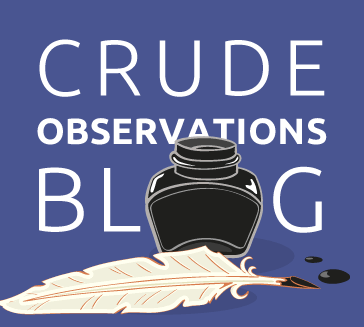So there I was thinking that this week was going to be another of those weeks where I have to search long and hard for inspiration to break this seemingly endless bout of coronavirus writer’s block that seems to come and go depending on the weather and time of day.
Sometimes I am never sure what will happen when I sit in front of the keyboard or what strange brew will spill out of my brain. Some weeks I have perfect clarity that I know what needs to be discussed.
This week is of course completely typical. Home office working, many calls, some client work. Did the Tuesday coffee (more on that at the end). It was a fairly humdrum week all things told and it seemed like there would be nothing to write about. Energy markets were calming down, people were starting to drive more and the general level of animus and rage appeared to be abating. The US rig count is at its lowest level since 1940, but that’s not that big a story anymore.
So really I had nothing to write about.
Then of course Elizabeth May and Yves Blanchet happened. Who are they you ask? No they are not the latest supergroup duet spinning covers of classic Sonny and Cher opuses. Nor are they hosts of some new socially distanced bilingual version of Entertainment Tonight.
Nope, they are the leaders of, respectively, the 3 seat Green Party of Canada and the 32 seat separatist Bloc Quebecois party.
Why are they notable you may ask yourself, for anything aside from their fringiness?
Well it turns out that both have been spending too much time out of the spotlight and decided that this was the week that they would very publicly announce their opposition to both support for the oil and gas industry as well as making a call for the elimination of the oil and gas industry in Canada for good measure. The Green Party going so far as to say “oil is dead” whatever the F that is actually supposed to mean.
Look, I know they are well-intentioned, but this is tone-deaf and unsupportable political opportunism and hypocrisy in a pretty pure form. Not to mention a moronic statement that just serves to show how out of touch they are from things like business, economy, employment and, well, reality.
Let me assure you. Much like the fish tale in the image above, the prospect of the “death of oil” is greatly exaggerated,
I know, I know – demand destruction has altered the landscape for oil in 2020. And Saudi Arabia and Russia had that funky price war that exacerbated things. And Canada’s oil sands are expensive to produce. You don’t need to tell me that. And there was that major study from the Oxford Review of Economic Policy, from which Ms May swiped her “oil is dead” quote, that suggested that post pandemic investments must flow only to renewables to create the “jobs of the future” and from this we are supposed to make the leap that an entire industry should be sent to the gallows. Pardon me my skepticism for a study co-authored by one of the more strident climate change alarmists around.
What I found particularly annoying was the absolutism. The incredible certainty expressed by Ms May that she was right and everyone else wrong. It’s the same sort of half-informed bull pucky that drives rational people off the deep end. It’s like a conspiracy theory – “look – here’s this thing… yeah but I can easily refute 80% of that… but the other 20% therefore shows that I’m right…” Aaagghh!
At any rate, no sooner had those statements seen the light of day than the pro-oil trolls came raging out of their caves – waving their pitchforks and spouting a mix of personal attacks the same tired arguments – which is of course the very reaction that these minor politicians wanted to get even more media attention and fire up their admittedly small bases.
A tweet from Peter MacKay, one of the stumble bumbles seeking the leadership of the Conservative Party of Canada, encapsulated quite summarily this reaction with a retort along the lines of “yah, but how did they manage to travel to Ottawa” which was immediately derided by noted Twitterati Max Fawcett as the dumbest possible argument and who then said that May and Blanchet could go pound sand and that he could take apart their argument in ten different ways. Which is interesting in two ways. First off, apparently I’m not the only one who feels that there are better arguments against this type of nonsense and second, I finally had my blog.
So forthwith, I have elected to take up this challenge.
Accordingly – 10 different ways that May (oil is dead) and Blanchet (no subsidies to a dying industry) have got it wrong… As well, 10 covnenient one-liners that industry supporters should put in their quiver for quick Twitter responses to the next attack – because you know it’s coming.
To show you how it’s done, I asked Max to give me a first example, which he directed towards Mr. Blanchet and his anti-subsidy stance.
- Sorry, the leader of the Bloc Quebecois doesn’t believe in supporting an industry that “won’t be self-sufficient at any time in the future”? That’s odd, given how consistently the Government of Quebec props businesses and industries like that up all the time. Indeed, some of Quebec’s most visible companies — bonjour, Bombardier — are the product of massive government support and intervention. What Blanchet really means is that he isn’t interested in supporting an industry that doesn’t have a political constituency in Quebec.
Twitter version: Don’t talk to me about subsidies you Separatist poser when all Bombardier does is suck governments and pensions dry to finance trains that don’t work.
- To Ms May. An oil demand shock that has taken somewhere in the range of 30 million barrels per day of demand off-line at its peak in no way translates into a permanent demand impairment as you imply. You cite the IEA demand forecast for the year as being down 6.8 million barrels from their original forecast. Sure, but that original forecast had demand growing to 101-2 million barrels of oil per day so consumption will only be off 5 mm bpd. Using my math hat this tells me that demand would have to recover pretty robustly in the second half of the year to make the averages work. And you completely ignore any forecasts for 2021, which are currently projecting to 2019 level consumption, otherwise known as the highest consumption ever. Want more? Consumption in China, which is still pulling out of its lockdown, is in a V-shape recovery and is already at close to 90% of pre-pandemic levels.
Twitter version: Short term shocks don’t reflect long term trends. Talk to me in a year and don’t trust the IEA, they are agenda driven and always wrong..
- The arguments about oilsands being a sub-standard and inferior product and not in demand are tired and have been proven wrong time and time again. Demand for heavy oil globally is actually increasing. Why? Because the more complex molecules in heavy oil allow it to be refined into a much broader multitude of products, including diesel, asphalt base (we have lots of roads BTW), heating oil, kerosene, LPG, naptha, jet fuel, etc. This is why so many refineries in the United States are configured for heavy oil.
Twitter version: Stop slagging our product. The reason we produce so much is because it’s versatile. The reason it’s cheaper is because it travels vast distances.
- We are 100% supportive of investment in renewables. But we also don’t have our heads in the sand. You can actually have both. In fact, oil and gas companies are some of the largest investors in renewables on the planet. Why? Because they are energy companies and they realize that to be successful they need to have a portfolio of energy products. This includes the energy troglodyte province of Alberta by the by, which has among the highest investments in solar and wind in the country, something oddly never mentioned by Ms May.
Twitter Version: No one is arguing against renewables. We can have both and that’s is probably the best way to an effective and less disruptive transition.
- In singling out the “dirty tar sands” and saying the oil and gas industry needs to be shut down Mr Blanchet exposes a startling lack of knowledge about how the energy economy works globally and a callous disregard for how his home province is energized. Aside from the hydro electric power Quebec gets from its massive and ticking methane bomb in James Bay, Quebec is a major consumer of propane, natural gas and crude oil, the vast majority of which come from, of all places, Alberta. Letting the oil sands wither does nothing except make Quebec and thus Canada more reliant on imports from other countries and to be in competition with other jurisdictions that want the same products.
Twitter Version: M. Blanchet, d’où pensez-vous exactement que votre énergie vient? Tabernac.
- Cheap oil and one-day negative oil prices are not the death knell for oil and panacea for renewables that Ms May thinks they are, nor are they an easy catalyst to massive green investments. Cheap oil is cheap energy. And if we are indeed in for a U-shaped recovery from the biggest hot to the global economy since the Great Depression, I for one am thankful that the price of energy has dropped like a stone. Lower gas prices have always been likened to a tax cut and in a world where many people are going to be squeezing every last dime or industries are starting up again from scratch or critical goods need to be transported across the country on crumbling highways, or agricultural goods need to be properly fertilized to feed a supply chain compromised global population, cheap energy and feedstock is going to be pretty darn important.
Twitter version: Cheap energy, primarily oil, has fuelled much of the economic gains and thus societal progress of the 20th and 21st century. Energy is the economy.
- In Elizabeth May’s world, we should be using this moment in time to pivot away from the fossil fuel industry and create the high employment growth renewable land of the future. Sure sounds good on paper. And it would be great to see all that investment (to go on top of all the investment that is already happening on its own). But what this fantasy land desire has already ignored is where is the money going to come from to fund this transition? The energy infrastructure around the globe represents an investment of many trillions of dollars, replacing it will cost multiples of that and take decades. To bring it back to the local, Canadian level, so far we have spent 25% of our annual GDP on income supports and financial backstops as a result of this pandemic. We don’t actually have the money to fund this transition and the appetite for spending even more is going to be pretty slim. To fund any of this, we need a growing economy and a tax base that is expanding and can afford to subsidize a transition. The irony of course is that “oil and gas”, the sector that is being replaced represents close to 10% of the national economy and is Canada’s largest export and source of foreign dollars and thus represents the lowest hanging fruit to generate the tax revenue to fund its eventual replacement. So, to be able to afford to replace the oil and gas sector in Canada you actually need a healthy oil and gas sector. Go figure.
Twitter version: There is no money left for this fantasy unless the oil and gas sector recovers.
- Stop lumping the entire fossil fuel industry into one rhetorical basket. Leaving coal out of the mix, the oil and gas industry is one of the most complex industries in the world, providing affordable and reliable energy products and downstream commodities that power industry and contribute to the production of pretty much any product utilized by a modern society. Without an effectively pumping oil and gas cardio-vascular system, the global economy stops. You think a pandemic shutdown is bad? When only oil demand is down by 30%? Imagine a world where that commodity’s availability is reduced by 30% and then layer in a further 30% reduction in natural gas, because hey, it’s included as part of the fossil fuel equation. Where is the fertilizer going to come from? The plastic. Heat for homes. Fuel for vehicles. Is there any credible scenario where renewables can scale up in a timely manner to replace fossil fuels and displace that up/mid and downstream industrial complex? Short answer? No. And they will never replace the product side. Get serious Ms May. I didn’t just fall off a turnip truck.
Twitter version: Do you like golf? If there was no oil you wouldn’t be able to make the plastic outside of a ball so you wouldn’t be able to golf. If the courses were even green because you need oil and gas to make fertilizer.
- OK, I have to go to this one. This one is back to Mr. Blanchet. The energy industry in Canada supports hundreds of thousands of jobs across Canada. Not providing support to the sector as we negotiate this short-term liquidity crisis puts many of these jobs at risk and, lo and behold, a bunch of those jobs are in the finally recovering Quebec manufacturing sector. Is this what you want Mr. Blanchet? This is a good outcome?
Twitter version: Jobs!!!!!!
- Final point. Stop bashing the oilsands as high cost and uncompetitive with the US. You’re missing the point. There is absolutely a place for Canada’s “dying” oilsands in the energy mix and we are arguably extremely well positioned to compete in the future. Why do I say that when a new oilsands project needs $65 to $80 oil prices? Well first off, because many of the projects that required that price are already built and are responsible for the majority of Canada’s production with actual current production costs in the $20s. I don’t care how much it cost in 2013. I care about what it is doing now. And Canada’s oil sands are low decline rate (3%), long lived heavy oil assets. Contrast that with the treadmill-like lower production, high decline rate (65% in year one) light tight oil wells that have breakevens from, $40 to $87 and I will take Canadian oilsands all day long. While Canada’s installed base is stable and requires relatively minor brownfield investment to maintain or grow incrementally, US shale requires an ever-increasing level of annual investment and outside capital just to keep its head above water. Never mind the fact that as stated above, heavy oil doesn’t even compete with light tight oil – it’s a totally different product and unless Mexico reverses its terminal decline (not likely) or Venezuela turns on a dime (nope), Canada is a readily accessible and stable source of heavy oil and energy security for the United States and other countries.
Twitter version: Don’t trot out the ethical nonsense. Canada is a responsible, stable and reliable energy partner with a product in demand and an investment profile that isn’t modelled after a ponzi scheme.
Well there you go. That was ten. I could have gone on. I never even mentioned Canada’s politically stable climate. I didn’t explore the Saudi price war debacle. I did a stream of consciousness top 9.
Oil dead? Nope. It’s Not dead yet.
Last point for the Greens to consider:
If the Canadian oil industry is thriving, Jason Kenney stays in power, providing a much needed right wing anti environment piñata for the speedy McGreen party’s fundraising arm and a tremendous foil for the Bloc Quebecois separatist anti-Canada agenda.
Leave oil alone. Everyone wins.
Office Cat Week 9
Office cat came for a quick visit. Checked out the Mother’s Day presents hidden behind the desk, looked out the window and smelled the air. Then he left.
Stormont Capital Crude Coffee
We had the third edition of this last Tuesday at 10 AM and it was another great conversation and included dialogue about the state of the US private equity market in energy services and an update from a really cool technology business on what is possible with contract tracing and tracking apps.
This week I promise to have another interesting headline guest who isn’t me, although I reserve the right to rant about stuff that bugs me, just because.
As always, if you want to participate, please email me and I will add you to the roster.
Stay safe. Wash hands. Be kind.
Prices as at May 8, 2020
- Oil prices
- Oil storage was up (no kidding!)
- Production was down
- OPEC+++++ cuts starting
- Natural Gas
- Storage was up, historically very high; consumption down; production flat; exports flat.
- WTI Crude: $26.10
- Western Canada Select: $20.98
- AECO Spot: $1.891
- NYMEX Gas: $1.746
- US/Canadian Dollar: $0.7147
Highlights
- As at May 1, 2020, US crude oil supplies were at 532.2 million barrels, an increase of 4.6 million barrels from the previous week and a increase of 65.6 million barrels from last year.
- The number of days oil supply in storage is 41.9 compared to 28.5 last year at this time.
- Production was down 200k for the week at 11.900 million barrels per day. Production last year at the same time was 12.200 million barrels per day.
- Imports rose to 5.712 million barrels from 5.302 million barrels per day compared to 6.993 million barrels per day last year.
- Crude exports from the US rose to 3.546 million barrels per day from 3.302 million barrels per day last week compared to 2.322 million barrels per day a year ago
- Canadian exports to the US rose to 3.173 million barrels a day from 3.154 million barrels per day last week
- Refinery inputs increased during the week to 12.976 million barrels per day
- As at May 1, 2020, US natural gas in storage was 2,319 billion cubic feet (Bcf), which is 21% above the 5-year average and about 52% higher than last year’s level, following an implied net injection of 109 Bcf during the report week
- Overall U.S. natural gas consumption fell by 15.3% during the report week.
- Production was down 1.5% for the week. Imports from Canada fell 4.6% from the week before. Exports to Mexico were down 5.3%.
- LNG exports totaled 54 Bcf
- As of May 8, 2020, the Canadian rig count decreased 1 to 26 (AB – 15; BC – 7; SK – 2; MB – 0; Other – 2). Rig count for the same period last year was 58.
- US Onshore Oil rig count at May 8, 2020 is at 292, down 33 from the week prior.
- Peak rig count was October 10, 2014 at 1,609
- Natural gas rigs drilling in the United States is down 1 at 80
- Peak rig count before the downturn was November 11, 2014 at 356 (note the actual peak gas rig count was 1,606 on August 29, 2008)
- Offshore rig count was down 1 at 15.
- Offshore peak rig count at January 1, 2015 was 55
US split of Oil vs Gas rigs is 86%/14%, in Canada the split is 66%/34%
Trump Watch: No mask. WH staffer has tested positive. Doesn’t like TV ads.
Kenney Watch (new!): Reopening things so that they don’t have to stay closed.
Trudeau Watch (for balance): Money for Ag! New guest house at the cottage, can I visit?









